|
OF 2002
 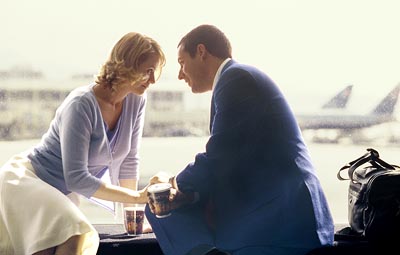
1. PUNCH-DRUNK LOVE
Believe me, I'm the first to be amazed to see me selecting an Adam Sandler movie as the best film of the year. But it's true. What I hope represents a new
shift in the types of film roles that Adam Sandler chooses is my choice for 2002's best film. Of course, so much credit must also go to the film's director,
Paul Thomas Anderson, who seems incapable of making a bad film. This marks his third film in a row that has managed to place in my top five films of
the year. Anderson clearly represents the next great personal film director, who is not afraid to take chances, not afraid to experiment, and not afraid
to confound all our expectations. After the huge epics of Boogie Nights and Magnolia, Anderson scaled things down considerably, but thankfully,
did not scale down in his style or his quality of filmmaking. The length of the film remains short for a P.T. Anderson film, but that serves to make
the film's story all the more concise and compact, as it moves us through the adventures in life and love of one of the screen's most unique and memorable
characters ... Barry Egan. Adam Sandler really doesn't act much differently than he has in some of his other films, but he's surrounded by much better
material, and his usual mannerisms actually serve this character extremely well. Sandler's mannerisms actually contribute more to this character,
who is so closed off from the world and has so much going on inside him. The film's opening itself shows the essence of Barry ... he's alone at a desk,
which itself is alone in what seems to be a barren warehouse. This otherwise typical day for Barry is interrupted when he takes a break, walking out
to the street, where he witnesses a spectacular car crash which seems to occur for no reason, followed by a truck zooming by, and dropping off a small
harmonium for no particular reason. As so many wonderful moments of symbolism that occur in Anderson's films, these events are never explained by the film ...
Anderson leaves us to determine their importance and meaning.
For me, the car crashing represents a signal to Barry that his life is nearing a critical point of ultimately crashing soon, and the harmonium is being
dropped off as his symbol of hope to finally break free of the demons that have plagued him for so long. I mean, does it really matter where these
things come from? There are so many things in life which are unexplainable ... what's important is how we interpret the unexplainable and what affect
they have on our lives. Not long after all of this, a beautiful and extremely trusting woman drives up, Lena Leonard, played wonderfully by the always
great Emily Watson. The two seem to have an instant chemistry which exists on a level only they can understand. After simply staring in the harmonium
in a bizarre curiosity for so long, Barry finally sprints to the street, picks it up, and carries it back to his "office", where it will become
a constant item that is returned to again and again throughout the film. From there, we see the troubles of Barry's life, from his seven sisters
who do nothing but berate him and make fun of him, to the mundane job of selling toilet plungers that he finds himself in ... all the while wearing the
same blue suit (he never changes in the entire film!) The character is partially based on a true story, in so much as Barry seems to think he has stumbled
upon the greatest deal in that he can get free airline tickets by collecting tons and tons of Healthy Choice pudding packages and redeeming their points
for frequent flyer miles. Barry is obviously lost, searching for something, anything that can be true and real. His frustration remains bottled up for so
long, until he can't hold it in anymore, which come out in surprising spouts of violence, whether smashing the glass doors in his sister's house, or
busting up a restaurant restroom. He's so tired of being lost and so tired of his life going wrong, it would be almost painful to watch if it weren't for
how funny the film still remains. Barry ends up making one final mistake, that of calling a phone sex line, that causes him even more frustration
when the disreputable company offering the sex line decides to extort money from him.
The film is one brilliant unexpected surprise after another, where you are sitting there never knowing what will happen next. I can't remember that many
films that could keep an audience surprised throughout for which way this story would turn. It's a brilliant examination of this one man's life, but most notably
through the love story, which as bizarre as it might be, actually ends up making for an old-fashioned film romance. The closing sequence of this film
is so simple yet so extraordinary, as we sense that finally Barry has removed his demons and has found something finally true and real in life. Watson's last line
is so great ... "Here we go" ... their lives have truly begun. Paul Thomas Anderson has framed this story with his usual style, creating some truly
memorable images, and I can't say enough about how so many turns in the film result in absolutely surprising results that the audience simply does not expect. Simply
watch the scene when Barry finally tracks the owner down of the disreputable phone sex company and just watch how your expectations are thwarted. It's exciting
filmmaking of the first order, and one of the most unique films you'll ever see. It was a tough choice to make saying that this film was the best of
the year, but only because 2002 was so extraordinary in the number of truly wonderful films.
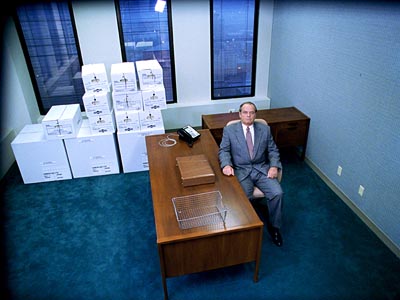 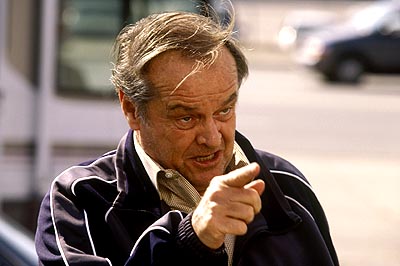 2. ABOUT SCHMIDT
For Barry Egan, he found the opportunity to change his life, but for Warren Schmidt, he has lost that opportunity and is now having to face what his life
has become. This was another film that was a wonderful mix of comedy and tragedy, and represented what is perhaps one of Jack Nicholson's most unique and very
best performances. Much has already been said about how much Jack tones down the "Jack" this time, and he really does ... he reminds us yet again of
what a wonderful and talented actor he is, as he completely embodies this man who is so totally different from the celebrity "Jack" we know. In this film,
superbly and craftily co-written and directed by Alexander Payne, About Schmidt tells the tragic story of Schmidt, a man who is retiring from his
mundane job of insurance actuary, to soon find out that everything he dedicated himself to in life has come to mean nothing, and he ends up having to deal
with the fact that he may really mean nothing to no one. We see this from the beginning, as Jack finds no solace or happiness from the tributes given
at his retirement dinner, where he instead escapes off to the bar for a drink. In an attempt to find some meaning to his life, Warren begins writing letters
to a young child halfway across the world who he is helping through one of those child outreach programs by sending $22 a month. In these letters, we
get to hear Warren's true thoughts. Warren has been a man who always went with the flow, but perhaps dedicated his life too much to his job, and had never
took the risks necessary to try to make his dreams come true. Warren's mundane retirement becomes shattered when his wife suddenly dies, and now he must not only
face retirement, but now must face it alone. He embarks on the road in the new Adventurer motor home that Warren and his wife had bought to travel on their
retirement, all in an attempt to ultimately stop his daughter from making a mistake in marrying a shady waterbed salesman. Throughout all these journeys,
I was struck with so much sadness. This film made me cry more than any other film ever has, and not many film moments are able to bring me to tears. Nicholson
is so extraordinary in portraying a man struggling with so much sadness, yet he covers it all up as best as he can. All of the performances are universally
powerful, from the wonderful manic genius of Kathy Bates (who bravely does a brief nude scene when she tries to make the moves on Warren) as the mother-in-law
to be, to the tragic nature of Schmidt's daughter Jeannie, played by Hope Davis. We see how much tragedy she may be inviting upon herself, and we wonder
how much of Warren's neglectful nature when she grew up has contributed to this. Alexander Payne has achieved something truly extraordinary and touching
with this film ... he manages to convey a story of such emotional tragedy, but with so much comedy as well. I think you'll find yourself laughing just as much
as you are crying throughout this film. I can't say enough about Nicholson's performance, especially his closing scene when so much emotion just
finally comes out. Payne's story is an important one here, and I think all young people would do well to heed its messages ... this film reminded me of
a wonderful quote by Mark Twain, that applies so much to the life of Warren Schmidt and the warnings we can all take from it ... "Twenty years from now you will be more disappointed by the things you didn't do
than by the ones you did do. So throw off the bowlines. Sail away from the
safe harbor. Catch the trade winds in your sails. Explore. Dream. Discover."
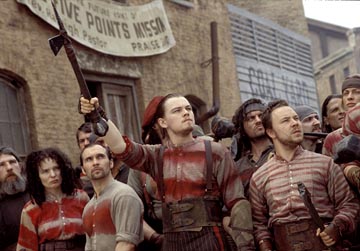 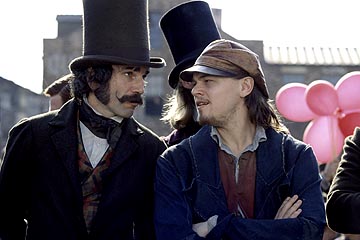 3. GANGS OF NEW YORK Martin Scorsese has no doubt proved his worth in so many seminal films already, and with his newest film, he proves even more why he is perhaps our greatest living film director. What's intriguing about this project is that Gangs of New York was a film that he had been wanting to make for 25 years. It was a film so plagued by studio/director battles, a one year delay in its planned release, and so much more that one wondered how the final product would ultimately be. But Scorsese is clearly in a league all his own, and it's nearly impossible for this director to make a bad film. Gangs of New York is a massive epic that reminds us how great film epics used to be made. The art direction in this film is so incredible, as we clearly find ourselves back in 1870's New York. This film covers an aspect of this country's history that some people may not have even been aware of, I know I hadn't. We all know so much about the battles that took place during the Civil War, but I bet that most people were not aware of the battles that took place in New York during the Civil War years. Gangs of New York masterfully and powerfully tells the story of the Five Points area of New York City, and how in its bloody streets, the battles for America raged. Daniel Day-Lewis, returning from a self-imposed exile from film roles, is extraordinary ... he clearly gives the year's best performance by an actor. He portrays William Cutting, aka Bill The Butcher, an actual person, who controlled the Five Points area, and fought bitterly to keep the immigrants from taking over. At the beginning of the film, Bill takes down Priest Vallon, played by Liam Neeson, the leader of the Dead Rabbits, one of the immigrant gangs. Years later, Vallon's son returns to the Five Points to avenge his father's death. Leonardo DiCaprio gives one of his best performances yet as Amsterdam, as he slowly works his way into Bill the Butcher's gang, never forgetting his ultimate purpose. Day-Lewis portrays one of the most complex villains to ever grace the screen. He wants America to remain for the Americans, and fights at all costs to defend what he feels is right. Scorsese relaxes his usual camera style in this film, instead letting this epic play out in full widescreen glory. Scorsese never shies away from the realism of violence, and he clearly invests so much of himself in every film. Although it's harder to see Scorsese's personal side in his larger epics, especially this one, you still get the clear sense of his love for New York, and how so much of what came after in New York and America was formed through the wars waged in those streets. Powerful filmmaking from a master of filmmaking.
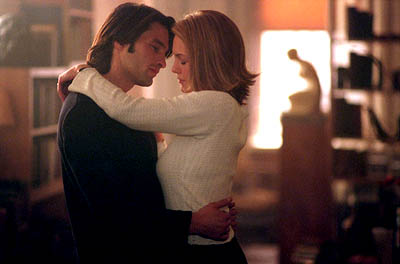 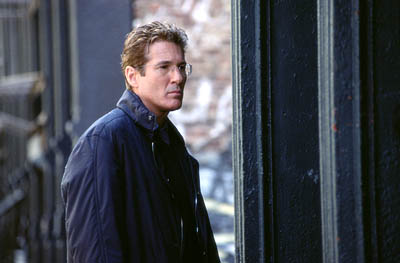 4. UNFAITHFUL
In 1987, Adrian Lyne made what was then the landmark film about adultery with Fatal Attraction. Unfortunately, too much of our memories of the film
take away from the real issues and instead we remember boiling bunnies, and a thrilling ending with Glenn Close wielding a knife coming out of the bathtub.
Lyne is clearly interested in examining one of the most difficult issues that face married couples, that of infidelity. He did it with Indecent Proposal, but it
again still had to have a gimmick to tell its story, this time showing adultery when an amount of $1 million was offered for the wife to stray. But finally,
Lyne directed a film about infidelity which explores the topic honestly and realistically, how often adultery occurs in what seems to be the most happiest
of marriages for explanations that can never be described. Unfaithful is Lyne's effort to tackle infidelity realistically without gimmicks and
thriller machinations, and he does so extraordinarily well with his usual dark noir style. This time, Lyne focuses on the wife having the affair. Diane
Lane gives the best performance by an actress this year for her emotional performance as Connie Sumner, who is living what appears to be a perfect life
with a son and her husband Edward, played by Richard Gere in one of his most complex performances. Gere is not the womanizer this time, and thankfully, Lyne
does not portray him as a bad husband. He's not really guilty of neglect, or abuse, or any of the other reasons that might drive his wife into an affair.
Connie doesn't appear to be looking for an affair either, but she one day accidentally runs into a young man, Paul Martel, played by Olivier Martinez, during
a blustery day (perhaps too overdone as blustery). Lyne examines the true nature of why affairs occur, usually because of the lack of excitement that is lost
after people have been married for so long. Even though there are cops and some physical tragedy in the film, this does not become the concentration
of the film. Instead, Lyne deals with the complex emotions involved in an extramarital affair from all sides ... from Connie, who realizes what she is
doing is wrong but who can't fathom ending it. To Edward, to whom loyalty matters so much, whose insides are torn apart when he discovers his own wife
has cheated on him. Gere has an extremely powerful and surprising sequence when he actually shows up at Paul's apartment, and calmly discusses the details
of their affair. The stares towards the bed where his wife and this other lover made love, the very physical details of the apartment ... it's an absolutely brilliant scene.
But there is perhaps no better scene in a movie this year then when Connie is riding back home on the subway remembering back on the first time she made love
to Paul. Instead of simply presenting the scene of making love between Connie and Paul, we see Diane Lane in a performance of extraordinary realism
and depth, as we simply hear no dialogue, but simply watch the range of emotions, as she remembers the trembling in her own body when Paul is kissing her,
to the first pangs of guilt as to what she has done. There are no easy answers in this film, just as there are no easy answers in life. Lyne has made a very serious and realistic portrait of infidelity, and clearly one of the year's best films.
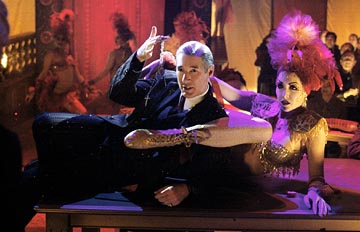 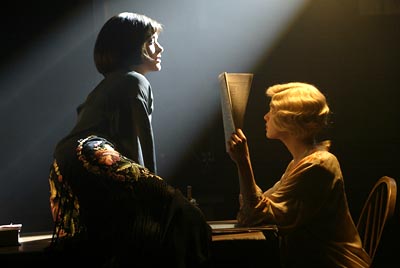 5. CHICAGO I'm always intrigued to watch how certain movie genres go out of style, disappearing for so long, to finally be revived again in the future. We've seen it happen with the Western, but I wondered if we would ever see a resurgence of the movie musical. The movie musical was once of the most popular genres that existed, dominating Academy Awards and box offices for so many years during the golden age of Hollywood. But soon, musicals died out in popularity, especially towards the end of the 1960's, when the more personal, darker, director-driven films arrived in the 70's. And for three decades, the musical has only had one or two brief tries at a resurgence, but has never come back into vogue. But perhaps now that will be changing again. 2001's Moulin Rouge was the film to really get it started, and this film, the adaptation of the Broadway musical Chicago may firmly bring the musical back. The one thing that I responded to the most in this film is its energy and passion. Everyone involved is so "involved" in the project, from Rob Marshall's skillful directing and fast paced editing, to the actual singing and dancing by the film's leads, most notably Richard Gere, Catherine Zeta-Jones, and Renee Zellweger. They all deliver wonderfully over the top performances, particularly Zeta-Jones, who has never seemed more alive and more sizzling on screen than she has here. While the film's story may not seem as revolutionary today as we have already seen so many examinations about how celebrity can be so easily manufactured to only flame out later, the fact that we're seeing a purely old-fashioned movie musical makes it all the more exciting. And this one really does have the old Hollywood kind of feel to it. So many wonderful musical sequences ... particularly effective is John C. Reilly's "Mr. Cellophane" solo dance number, recognizing his character's own sadness at being run over and forgotten by everyone, even his own wife, Renee Zellweger. It's simply a joy to watch this film, and if we do see a return of movie musicals in force, this time could now be looked at as the start.
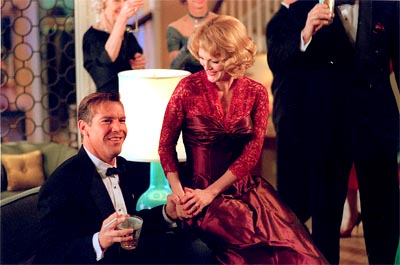 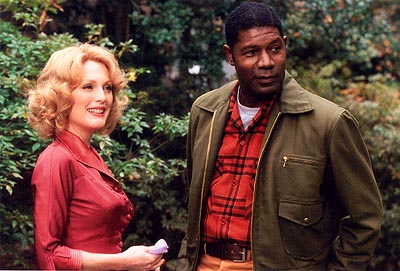 6. FAR FROM HEAVEN Speaking of old fashioned Hollywood style, Todd Haynes practiced inordinate restraint to test audiences and see if they could watch a 1950's film that acts like it's being made in the 1950's. Much has been made about Haynes having made a film which would fit perfectly in the canon of director Douglas Sirk, who was actually making groundbreaking human dramas like this one in the 1950's. Haynes however tackles issues that could have never been handled in the actual 1950's films, but still keeps them in their timeframe. Let me explain. A lot of period movies tackling subjects like homosexuality and interracial relationships that took place in the 50's would most likely apply today's sensibilities to them, or give a more modern slant to them. But Haynes is brilliant in how he keeps all the characters and story anchored in their time, as the characters honestly deal with their situations as they would have most likely handled them in the 1950's. Julianne Moore absolutely is the center of this gorgeous visual feast, playing model housewife Cathy Whitaker, who soon discovers that her husband actually has homosexual interests. Dennis Quaid gives one of his best performances as the husband Frank, who is ashamed of his homosexuality, and actually tries to go to a doctor to try to "beat it" in his words. Frank seemingly wants to live a so-called "normal" life, and thinks he can work his way out of this, only to find that it's ingrained in him. Cathy meanwhile is engaging in something taboo for that time as well, as she becomes slowly involved with the African American gardener, played powerfully by Dennis Haysbert. As I mentioned before, the cinematography and attention to period detail are absolutely extraordinary in this film, but it's the incredible performances that show us that the same difficult issues we face today existed then, and shows us even more that life and especially love are more complicated than some like to say, and made even more complicated by the various rules of society that we find ourselves in at various periods of history.
 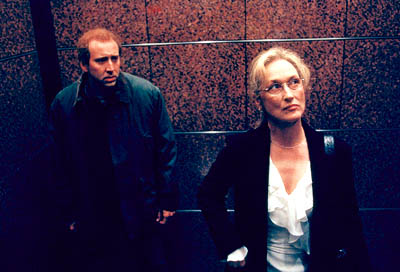 7. ADAPTATION. Are all screenwriters like this one? Of course not, but what if you had to adapt a complicated book like "The Orchid Thief" by Susan Orlean? That's the story of this incredibly original film about moviemaking which must rank as one of the greatest films about the industry to ever be made. In reality, there is a screenwriter named Charlie Kaufman, who was given the assignment of adapting this actual book on the heels of having written the wonderful indie success, Being John Malkovich. As he struggles with adapting this novel, unable to find his ability to write, he ends up writing himself into the screenplay, as he instead starts to write a screenplay about a screenwriter named Charlie Kaufman trying to adapt this book, and that's the film we're ultimately watching. So instead of a complete adaptation of Orlean's book, we get a movie that examines the screenwriter trying to adapt the book, and then going off into a wild story all his own. I can't say enough about Nicolas Cage's performance in this film, it has to be his best yet. And if Daniel Day-Lewis hadn't been so damn good in Gangs of New York, he would have been my pick for Best Actor this year. Cage has two roles in this film, playing Charlie Kaufman, and playing his twin brother, Donald. Instead of having to rely on makeup and wigs to make these characters different, Cage instead pulls off convincing and unique personalities for each brother, and we never have a problem knowing which brother is on screen at the time. Cage also does incredible and believable acting in conversations between the brothers, particularly during the final scenes when Charlie opens up to Donald about what he means to him. Meryl Streep gives another wonderful performance as Susan Orlean, as we see a story developing more about a supposed relationship that Orlean developed with her book's subject, John Laroche, played incredibly well by the always great Chris Cooper. Even though the ending goes slightly off the edge, this film is another exciting film experiment, anchored so fully by Nicolas Cage in two extremely layered performances.
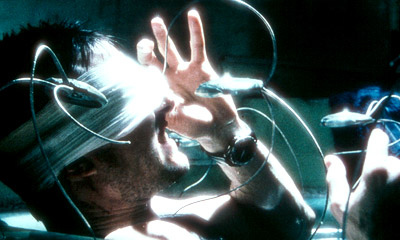 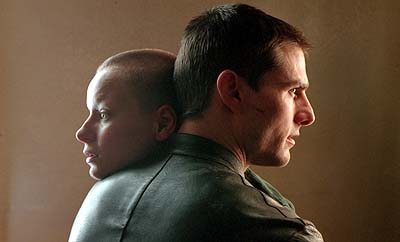 8. MINORITY REPORT Steven Spielberg continues to amaze. He continues to remain such a productive film director, as he made two very good films this year (both of which made my top ten list), and he continues to show that he is one of our greatest and most versatile film directors. His most successful effort this year was his science fiction film from the summer, Minority Report. In this film, Spielberg again launched us ahead in time to examine our potential future, and what technology and our uses of it may hold in store as we move along. This film feels like a more realistic future than his wonderful A.I. did from last year, and has some incredibly powerful things to say about actions that we be starting now to one day come to this kind of police control. Tom Cruise gives another powerful performance as Detective John Anderton, who is one of the leading proponents of Pre-Crime, a new crime fighting unit in Washington D.C. that uses the advance visions of three gifted Pre-Cogs to see murders before they took place, searching through the visions for any detail that will lead them to the eventual crime scene, where they can stop the crime from taking place and take the future perpetrator into custody. The film poses many questions, not always providing distinct answers. I mean, in theory, a system that could accurately predict murders, allowing us to prevent them from happening, would sound like a good thing. But what if one flaw could be found in the system? The same debate occurs now over our country's death penalty, and Spielberg frames a story around these issues as one of the visions shows Detective Anderton himself committing a future murder, and then Anderton must run from the same crime unit he once headed to prove his future innocence and discover what has happened. Spielberg again shows a mastery of visuals, as he and his trusted cinematographer, Janusz Kaminski, create a dark yet vibrant future, and the visual effects are absolutely seamless and stunning in this film, as new technology is mixed with the cityscapes of Washington, D.C. today. It's a wonderful adventure framed in a story which presents us with some real questions ... which is what the best science fiction always does.
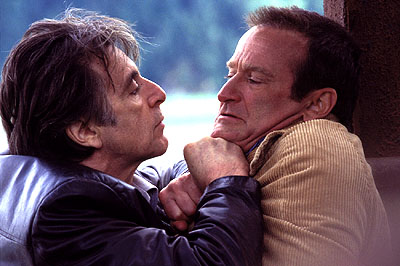 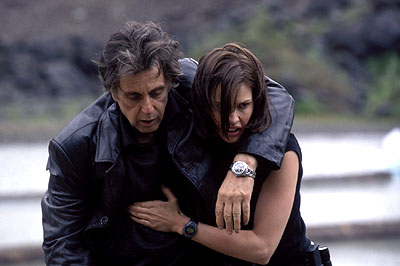 9. INSOMNIA Christopher Nolan followed up his brilliant Memento with this more traditional but still original mystery suspense thriller. Al Pacino delivers yet another multi-faceted performance as Will Dormer, a veteran Los Angeles homicide investigator, who is sent up North to investigate some strange serial killings happening in a small town in Alaska. It's a town where the sun never sets, and the insomnia of the title is what Dormer is suffering through during this investigation, as he can never sleep. He also has trouble sleeping because early on in the investigation, he accidentally shoots his partner. The film then gets very intriguing because guess who witnessed Dormer shooting his partner? None other than the killer being tracked, Walter Finch, played very well by Robin Williams. The film's story becomes incredibly complex, as Dormer attempts to cover up that crime, while trying to track another one. And soon, killer and investigator soon meet, where they eventually have to confide in each other in strange ways because of the secret that only both of them share. It's a suspense thriller of wonderful visual atmosphere, elevated by the performances by Pacino, Williams, and Hilary Swank as the young local cop who ends up having to investigate Dormer, the man who was her hero.
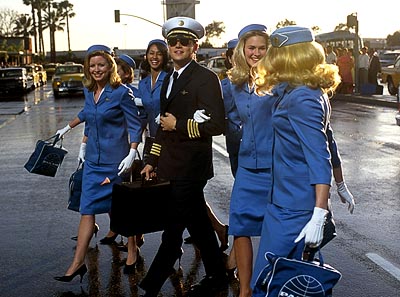 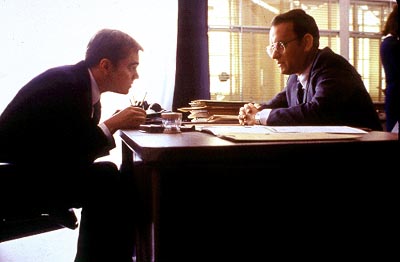 10. CATCH ME IF YOU CAN After having directed so many films which stretched him as a director, Steven Spielberg proved to us by the end of 2002 that he had not forgotten how to simply entertain audiences with a purely fun film. He did it with an amazing true story in Catch Me If You Can. It's the story of Frank Abagnale, Jr., who in the 1960's was actually able to make fake checks, don a pilot's uniform, and pass himself off successfully as a pilot, even though he was a teenager at the time. It was certainly a different time, where these cons could work, and Abagnale successfully passes himself off as a pilot, a Secret Service agent in one hilarious con, a doctor, and a lawyer. The whole time, he is being tracked and pursued by an FBI agent named Carl Hanratty, played by Tom Hanks in a wonderful supporting turn by the always great actor. They form a wonderful relationship of con man and law man, that eventually becomes endearing, especially how they continually seem to communicate with each other at Christmas time! What makes this film experience so wonderful is that Spielberg simply plays this film for fun, not attempting to make it any grander than it is. He simply presents a wonderful film story, and he does so with his usual attention to detail, making a film that very much feels like a fun society film from the 1960's. Even from the brilliant and original opening credits sequence, all set to the jazzy score by John Williams, this movie simply exists to put a smile on your face, and amaze you that most of it actually happened. Spielberg again surrounds himself with a wonderful cast, particularly Leonardo DiCaprio as Abagnale, who portrays all the charm necessary to make us believe that Abagnale could actually get away with all he did get away with. Christopher Walken is also effective as the pitiful Senior Abagnale, who seems to have inspired his son to do what he does. With this film, Spielberg again proves that he is the master of film entertainment.
By now, most people have probably received the forwarded e-mail that told the story of a beautiful woman who tested the man she was going to meet for the first time one day by having a rather unattractive, larger woman show up to claim she was this woman the man was meeting, to see how the man would react. The man reacted kindly, still wanting to go to dinner with the woman, and that's when the woman reveals that she was actually asked to do this by this other woman, who said to meet her at the dinner place if he had actually still approached the woman. It's a test to see if the man was truly interested in the woman he had communicated with, or if he would be turned off immediately by her looks. Well, Jeff Bemiss actually took this story to expand it into a short film which was truly extraordinary. Bemiss sets his short film in 1942, and recreates the period perfectly, as he shows the letters exchanged by a man about to go off to war and a woman who he discovers by finding her name in a book he has purchased. They initially share correspondence by mail to discuss the book, eventually forming a very powerful and meaningful relationship to them both even though they have never yet met. When he is finally shipped off to war, he decides that he wants to finally meet her before his uncertain future unfolds. That's when the well known internet story unfolds, and even though most may know the story's outcome by then, the moment is still moving. The short film is a wonderful love story, set realistically in a time of great chaos.

Honorable
Mentions
CHANGING LANES: Ben Affleck and Samuel L. Jackson both incredible in a simple story about how two men's lives change forever by one car accident.
8 MILE: Well, it managed to make me more respectful of singer Eminem, as he is very good in a story loosely based on his humble beginnings, Curtis Hanson
directs with wonderful insight into street life
THE GOOD GIRL: Jennifer Aniston in a comedic and strangely dark film, John C. Reilly gives another good performance as a dowdy husband
THE HOURS: Wonderful acting by all in three powerful stories ... Nicole Kidman, Julianne Moore, and Meryl Streep ... an acting powerhouse
25TH HOUR: Spike Lee's powerful portrait of one man's last night of freedom before going to jail, a wonderful cast headed by Edward Norton
SPIDER-MAN: The most successful film at the boxoffice in 2002, and for good reason ... it's a superhero film of great craft and performance, and makes this franchise look like
one worth watching
PANIC ROOM: Jodie Foster is amazing in a powerfully effective and claustrophobic thriller
THE LORD OF THE RINGS: THE TWO TOWERS: Peter Jackson again delivers, the visuals are astonishing, particularly Gollum, the first real
computer generated character in the movies that makes us forget we're watching a computer generated character, all continuing along interpreting
the J.R.R. Tolkien classic
RABBIT PROOF-FENCE: A powerful story of a blight from Australia's past with absorbing performances
ROAD TO PERDITION: If it just hadn't been so obvious in wanting to put together the ingredients to make the perfect Oscar film, it might be truly
good ... but as it is, it still stands up powerfully, mostly due to Sam Mendes (the director) and the wonderful performances by Tom Hanks, Jude Law,
and particularly Paul Newman
THE PIANIST: Roman Polanski's harrowing portrait of one lucky survivor during the Holocaust
STAR WARS: EPISODE II ATTACK OF THE CLONES: Better than Episode I, George Lucas still proved that this is truly one of the best
film stories that has ever existed, and shows the path to the dark side the series ultimately must take, and all the while, has fun with a lightsaber
wielding Yoda. Criticize it all you want, this is still bravura filmmaking and enjoyable cinema, and how more gorgeous could Natalie Portman get?
MOONLIGHT MILE: For once, a realistic look at having to deal with the death of a child ... masterful performances by Dustin Hoffman and Susan
Sarandon as the unconventional grieving parents
AUTO-FOCUS: The harrowing examination of the seedy, sexually addicted life of actor Bob Crane, played by Greg Kinnear in an eye-opening performance
SOLARIS: I thought Steven Soderbergh's foray into psychological sci-fi was very successful, with some intriguing ideas, as George Clooney's
traveling astronaut sees a vision of his long dead wife
TALK TO HER: A powerful foreign film from Spain, again showing the immeasurable talents of Pedro Almodovar
Y TU MAMA TAMBIEN: Another powerful foreign film, this one from Mexico, about two young boys on the road with a highly sexual woman, and their
"growing up" experiences on that journey
 |
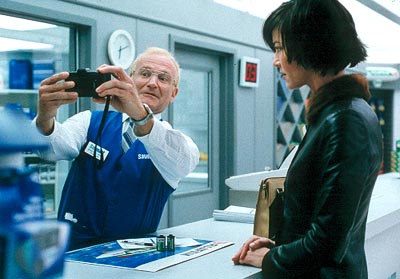 Robin Williams gave two very different and disturbing performances this year. First, in the aforementioned Insomnia, and in this, One Hour
Photo he delivers an incredibly tragic and creepy performance as Seymour Parrish, or Sy, a dedicated photo clerk at a one hour photo shop inside
a Walmart-like store. Sy it seems may be a little too dedicated to his work, as he becomes enthralled with one particular family who get their photos
processed by Sy, the Yorkins. The Yorkins seem to be the perfect family to Sy, and he fills his loneliness with duplicate prints that he has made of the Yorkin pictures,
putting them up in his own house, even in a frightening montage against one whole wall. He also fantasizes about being just another part of the family,
Uncle Sy, feeling the happiness and warmth of a true family. It's fascinating to watch Williams in this performance, and how his character breaks down
when all he dreamed about with this family come crashing down, and then slowly, his world begins to crash around him. Director Mark Romanek has
made a powerful and disturbing film, particularly in the final sequences, where Sy finally loses it all and takes out his anger the only way he knows how.
I was surprised by the complexity of the Sy character, as by the end, we can actually perhaps understand where his outbursts came from, and actually manage
to feel some sympathy for this guy, whose extreme loneliness is all too prevalent in so many people in reality. It's a completely unconventional thriller, more
tragic drama, and one is not soon to forget the character of Sy anytime soon.
Robin Williams gave two very different and disturbing performances this year. First, in the aforementioned Insomnia, and in this, One Hour
Photo he delivers an incredibly tragic and creepy performance as Seymour Parrish, or Sy, a dedicated photo clerk at a one hour photo shop inside
a Walmart-like store. Sy it seems may be a little too dedicated to his work, as he becomes enthralled with one particular family who get their photos
processed by Sy, the Yorkins. The Yorkins seem to be the perfect family to Sy, and he fills his loneliness with duplicate prints that he has made of the Yorkin pictures,
putting them up in his own house, even in a frightening montage against one whole wall. He also fantasizes about being just another part of the family,
Uncle Sy, feeling the happiness and warmth of a true family. It's fascinating to watch Williams in this performance, and how his character breaks down
when all he dreamed about with this family come crashing down, and then slowly, his world begins to crash around him. Director Mark Romanek has
made a powerful and disturbing film, particularly in the final sequences, where Sy finally loses it all and takes out his anger the only way he knows how.
I was surprised by the complexity of the Sy character, as by the end, we can actually perhaps understand where his outbursts came from, and actually manage
to feel some sympathy for this guy, whose extreme loneliness is all too prevalent in so many people in reality. It's a completely unconventional thriller, more
tragic drama, and one is not soon to forget the character of Sy anytime soon.
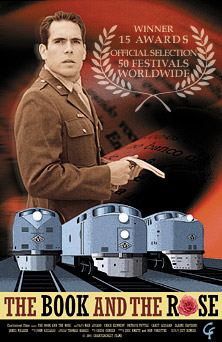 DISCOVERY OF THE YEAR - BEST INDEPENDENT SHORT FILM:
DISCOVERY OF THE YEAR - BEST INDEPENDENT SHORT FILM: